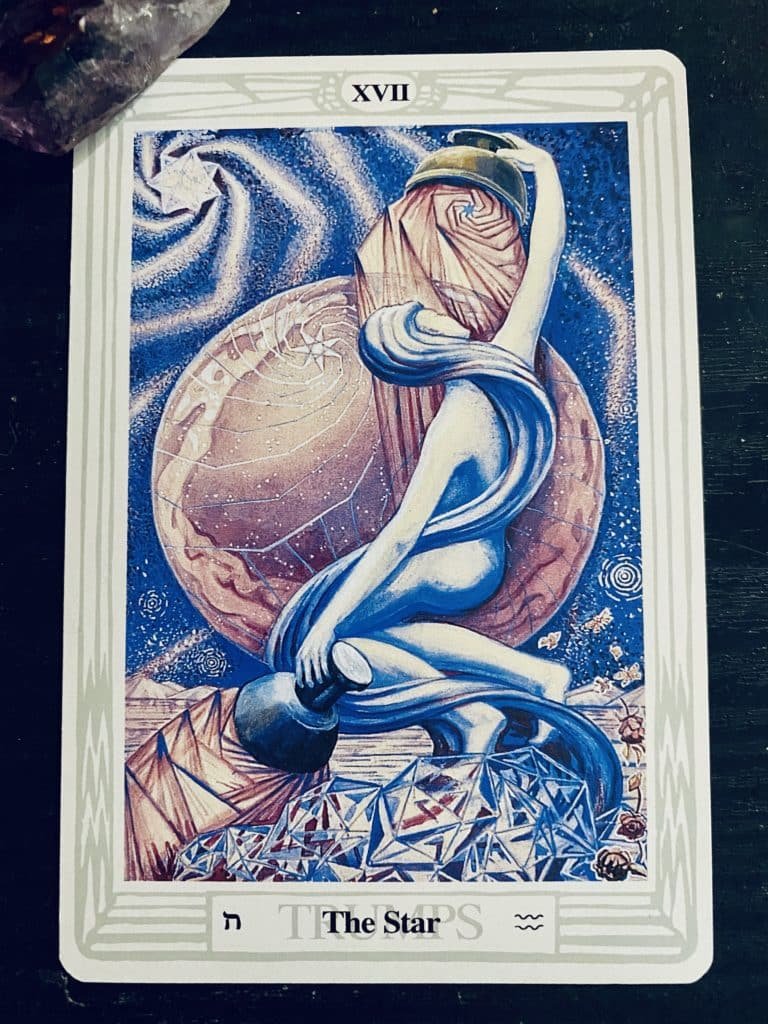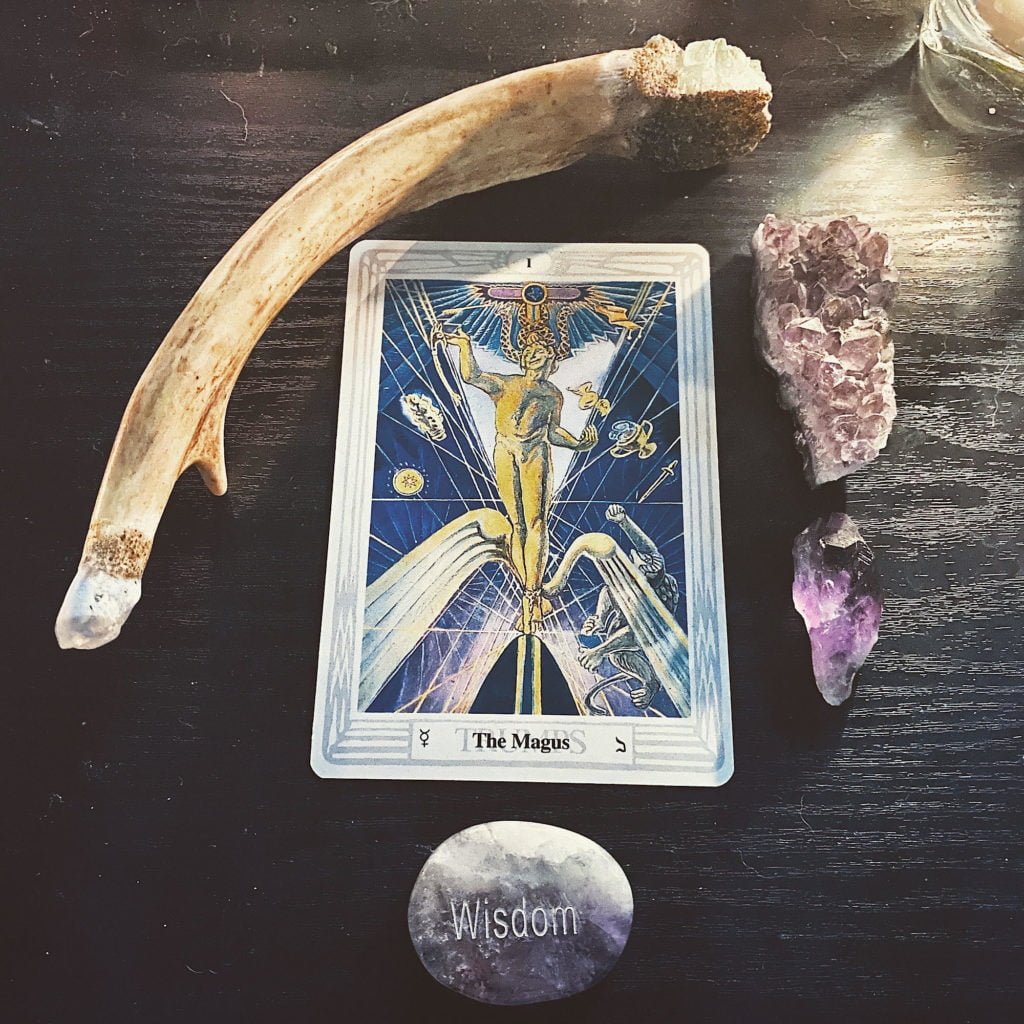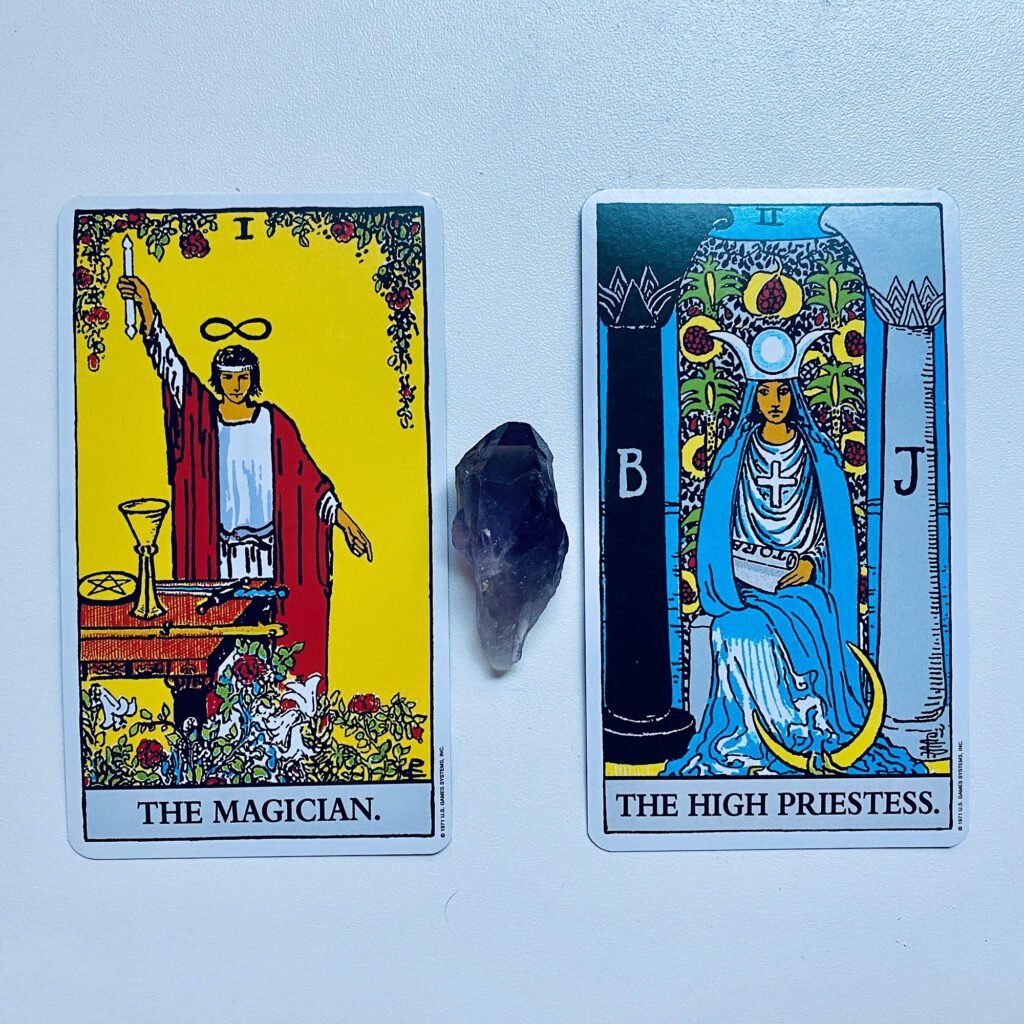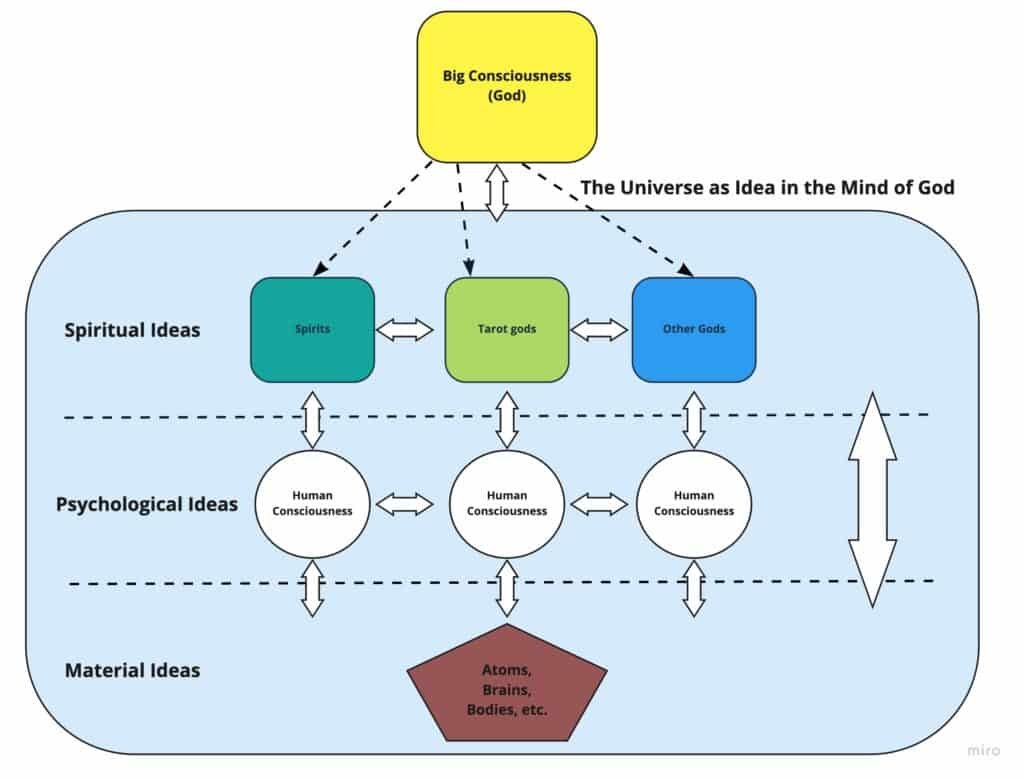
Neopaganism is an attempt to revive the pagan religions of Old into a modern form that can be actively and meaningfully practiced in the 21st century.
A classic example of a neopagan religion is Wicca. Wicca, like many neopagan religions, is often based on a kind of polytheism. Most Wiccans worship the Horned God and the Triplicate Goddess. Furthermore, Wicca is characterized by the usage of ritual practice and reverence for Nature. It must be noted that not all witches are Wiccans and not all Wiccans are witches. But central to the spiritual practice of most witches/Wiccans is the usage of magical tools. Moreover, one of the most enduring and popular tools of Witchcraft/Wicca is the Tarot, which is used for both divination and spiritual practice.
A new form of neopaganism
What I am calling “Tarotpaganism” is a new form of neopaganism that is primarily focused on the spiritual practice of the Tarot. This comes in two, complementary forms:
- A polytheistic approach to the Tarot where the various Symbol Systems of the Tarot are perceived to be autonomous Thought-Forms/God-forms of their own right in virtue of magickal intention/attention being poured into them.
- A ritualistic and spiritual approach to the Tarot that is focused on (1) study of the Tarot (2) contemplation of the Tarot and (3) spiritual reverence of the Tarot as a Symbol System.
Arguably, it is the polytheistic nature of Tarotpaganism that is most in need of explanation so let me start there.
Polytheistic Tarotism

Polytheism concerns the belief and worship of multiple gods. But what are gods?
If they are anything they are spiritual beings. But my supposition in defense of Tarotpaganism is that human imagination has the power to create spiritual beings. And moreover, the human imagination has already turned Tarot Systems into distinct spiritual beings.
Moreover, there’s already a concept in religious tradition for this: the Tibetan concept of a “tulpa.” Alexandra David-Néel first brought this concept of a Tulpa to the attention of the Western World with her 1929 book Magic and Mystery in Tibet, which was based on her experiencing of living in Tibet for 14 years and studying its religious and spiritual practices. She says,
“According to [advanced adepts in Tibetan secret lore] such phantoms are tulpas, magical formations generated by a powerful concentration of thought. As it had been repeatedly stated in the preceding chapters any forms may be visualized through that process.” (Magic and Mystery in Tibet, p. 327)
She says elsewhere,
“As I have said, some apparitions are created on purpose either by a lengthy process resembling that described in the former chapter on the visualization of Yidam or, in the case of proficient adepts, instantaneously or almost instantaneously….The apparitions, voluntary or unconsciously created, of a tulpa, either alike or different from its creator.” (Magic and Mystery in Tibet, p. 324)
In a sense then, Tulpas are akin to angels, as Dion Fortune defines them:
“An angelic being, then, may be defined as a cosmic force whose apparent vehicle of manifestation to psychic consciousness is a form built up by the human imagination.” (The Mystical Qabalah, p. 61)
In other words, the human imagination has the inherent capacity to create divine beings. Tarotpaganism concerns the practice of engaging with these beings in a serious manner.
Chaos Magick – servitors and Thought-forms

The concept of a Tulpa was popularized in Western magic circles within the framework of chaos magick and the concept of “servitors” or “Thought-forms.” According to my interpretation of chaos magick, a servitor is a Thought-form that is formed out of your concentration/Mind’s eye and which you can then send on various magickal errands, after the completion of which the Thought-form stops existing. Often, sigil magick is done with servitors in mind but the practice is also done without sigils with just pure imaginational willpower.
If multiple people all focus on creating the same Thought-form, it can take on an autonomy and independence of its own and become what’s known as an “egregore.” And finally, so it is rumored, if enough people pour their energy into the egreform and worship it is a god, it will literally transform into a more powerful God-form. Thus the evolution of Thought-forms in chaos magick goes like this:
SIGIL –> SERVITOR –> EGREGORE –> GODFORM
- Sigils: Unintelligent – representations of things
- Servitor: A thought-form that carries out a task, like a computer program
- Egregore: Thought-form that takes on a life of its own (Tulpa)
- God-form: An Egregore that has grown too powerful to be in the mind of just one person. It has a devoted base of worshippers.
Comparison with Wicca

The reason I am comparing Tarotpaganism with Wicca is Wicca is perhaps the best example of a de novo pagan religion starting in the 20th century and rapidly achieving some modicum of mainstream acceptance despite its still persistent (and totally off base) negative associations with “the demonic” and other negative stereotypes associated with witches/Wicca.
Although in Wicca the Gods and Goddesses of Wicca are novel foci of religious worship, having only begun in the 20th century, Wicca has gained popularity partly because it claims to be a spiritual inheritance from the Old Religions and Old Gods.
Similarly, Tarotpaganism, albeit a novel religion/spiritual system, derives its power from the spiritual inheritance and historical endurance of Tarot Symbol Systems. It is a fact that the Tarot has been used in occult and spiritual practice since at least the late 18th century. That is over 200 years of sustained spiritual/occult usage of the Tarot.
It must be noted, however, that throughout this long history the Tarot was primarily used as a tool to contact other spiritual beings rather than treated as divine or Holy in and of itself. Thus, to some extent, the Tarot lacks the power of the sustained God-forms of other religions. However, many modern Tarot practitioners do seem to treat their individual Tarot decks as having unique personalities even if they do not necessarily think of them as literal God-forms. For me, the occult significance of Tarot, coupled with its incredible long and rich symbolic history, provides ample imaginal power for the emergence of new gods and goddesses.
That is to say, despite the lack of historical precedent for treating Tarot Systems as polytheistic Thought-forms, the occult milieu right now is ripe for anyone to use their powers of imagination to engage with the Tarot as a polytheistic system deserving of sacred reverence.
A new spiritual approach to the Tarot

The long spiritual and occult history of the Tarot, stretching back several centuries, has blossomed into a modern Tarot renaissance where more people than ever are turning to the Tarot for spiritual guidance. What I am proposing is that Tarotpaganism can provide a framework for understanding the Tarot itself as something with intrinsic spiritual power and not just a tool which is granted power by external God-forms. Instead, with the right focus of the imagination, using intention and attention, the Tarot decks we own and use and study can themselves be God-forms in their own right.
But why? Why focus on Tarot as opposed to more traditionals forms of divinity? Why not turn to Wiccan gods? Or the pagan gods of old? Or the gods of dominant religions? Or why not tune into the spiritual practices of magical orders like Thelema? Surely all these systems have more spiritual potency than a mere deck of cards.
The answer to this question is deeply personal. I can not provide you a compelling reason why Tarotpaganism is more spiritually effective than any other religious or occult system of thought. All I can do is paint a picture of why Tarotpaganism appeals to me.
Why I Am Attracted to Tarotpaganism
First and foremost, Tarotpaganism is decidedly not an initiatory tradition in the sense of the Hermetic Order of the Golden Dawn or any other tradition that often associated with being more or less by invitation only.
Tarotpaganism is fundamentally an open and inclusive practice that is focused on education and encouragement. It encourages each Tarotpagan to develop their own unique ritual and spiritual practice involving the Tarot.
Furthermore, “worship” of the Tarot God-forms is not necessarily just heaping praise upon them or begging for Salvation. Rather it is about forming a personal relationship with divinity such that you develop the capacity to listen to the wisdom of the Tarot and use it for spiritual growth, guidance, and even practical spellmaking.
Tarotpaganism is a way to engage with the Divine without any of the traditional baggage from religious tradition or ceremonial/initiatory systems of magick. Which is not to say that Tarotpaganism is “better” than any other system. Rather, it is about making space for new forms of religiosity that are attuned to the unique needs of the 21st century.
And in the 21st century, Tarot holds a unique position in the witchy/pagan/occult world. It is a universal language with unlimited spiritual/magickal potential.
All I am suggesting is we learn to tap into that potential.
Do you really believe in all this?
Tarot decks as gods? Imagination creating actual gods? Do I really believe all this? I want to emphasize that a generalized attitude of agnosticism is not incompatible with an attitude like Tarotpaganism. I am not certain the Tarot gods exist. I am agnostic. It it is a belief system I am willing to try on. Let’s see what happens when I believe this. Do interesting things happen? Is my Tarot practice better? Do I get positive benefits from this belief system? That’s my ultimate arbiter, not whether it corresponds to reality. And even if it is a hallucination, even if it is just a delusion, it is a delusion that might serve me well. It makes my life better. That’s the working hypothesis anyway. And in that fashion I am willing to believe this. Not because of overwhelming evidence. But because I have the Will to Believe. It’s true for me because it works for me. It gives me good results in my life. Nothing more, nothing less.
Tapping Into More Powerful God-forms
With that said, I would be lying if I thought the Tarot gods are the most powerful gods around. Although Tarotpaganism is focused on the Tarot gods, it is not impossible to be a Tarotpagan and also to make room for the worship of other gods as well.
Tarotpaganism is kind of like Christianity insofar as Christians strive to have a “personal” relationship with Jesus but still worship God the Father and the Holy Ghost. Similarly, Tarotpaganism strives to have a personal relationship with the Tarot and one’s Tarot decks but still acknowledges the existence of other gods. Whether and to what extent you decide to focus on those gods in addition to the Tarot gods is up to you.
Personally, I have found that other gods are of the same type as the Tarot gods insofar as they are autonomous beings in some sense made out of consciousness. Some are more powerful than others.
My belief is that the gods of your own personal unconscious as well as the Tarot gods are all you need in order to be successful in the magickal path of the Great Work so long as you recognize that they may or may not be working in coordination with larger, powerful spiritual forms of consciousness.
The Holy Guardian Angel
Isn’t it dangerous to deify your own unconscious? Israel Regardie, in The Complete Golden Dawn System of Magic, wrote:
“Many students as well as those not involved with Magic often substitute a form of their infantile conscience for one form of “Higher Self” or another. This can lead to nothing but disaster. Instead of being guided by a Higher Genius the person is really at the mercy of infantile “voices” and values, so-called brain chatter. Not only does this cause undue individual suffering and deception, it also causes a complete halt to any real progress in the Theurgic arts and sciences. To a large extent this confusion contributes to the often “bad” reputation students of the occult possess.” [location 1345]
However, Regardie was a product of his time and the theories of the unconscious have advanced considerably since Freud’s model of the id, ego, and superego.
For Freud, the superego was hypothesized to be essentially a kind of moral conscience that strives for us to follow the culturally appropriate cultural rules taught to us by our parents. In some sense then it is extremely limited as a concept for it is culturally relative and based on social mores.
However, modern work on the unconscious, as indicated in works such as Julian Jaynes’ The Origin of Consciousness in the Breakdown in the Bicameral Mind or John Geiger’s The Third Man Factor point out that within all human minds lies a vestigial capacity to generate what Socrates’ called his Daemon or what the Egyptians called their Ka, that is, personal gods.
“A large proportion of the inventory type of cuneiform tablets have impressions on the reverse side rolled from such seals; commonly, they show a seated god and another minor divinity, usually a goddess, conducting the owner of the tablet by the right hand into the divine presence. Such intermediaries were the personal gods. Each individual, king or serf, had his own personal god whose voice he heard and obeyed.” (Jaynes, p. 184)
The personal gods or guardian angels possess the entire wisdom of the unconscious and due to the depth of its unfathomable parallel processing and computational power, these beings are many times more intelligent than the individual conscious ego. As Geiger chronicles, in many tales of extreme survival such as mountaineering, these guardian angels are activated and their vast intelligence and spiritual presence motivate and guide us to safety, providing advice and comfort.
These guardian angels or personal gods or whatever you want to call them are not mere “brain chatter” nor are they mere instances of a socially conscious Freudian superego. They are far more complicated and far more capable as intelligent beings.
I am proposing that these entities are of the same type as what magickal orders have for a long time called the Holy Guardian Angel and getting in contact with these entities constitutes a legitimate spiritual Path. Furthermore, I believe it is possible to tap into whatever power of the unconscious brain there is to make such entities in order to purposely create a new being, what the Tibetans called a tulpa. These tulpas have, in principle, all the same powers fitting of an unconscious spiritual being insofar as they are far wiser than the conscious mind, on account of being able to tap into the near-infinite processing power of the human unconscious. Moreover, the very same process is capable of happening and, indeed, has already happened for some, in regard to the personification of the Tarot and the various Tarot Symbol Systems derived from individual decks and their inspirational deck systems such as the Rider-Waite-Smith System or the Thoth System.
Personally, I have found the Thoth system to be much more powerful but that is just me. It is largely a matter of personal taste.
Larger Metaphysical Speculation
If my unconscious mind is capable of generating consciousness, even divine consciousness, where did my unconscious mind come from? Or where did my mind, in general, including consciousness come from? Common sense tells us it did not create itself but rather had an origin.
Thus begins the process of metaphysics, of going beyond my individual mind and looking outside for other minds and other sources of causative force. Where did my mind come from? And for that matter, where did the universe come from? These are important questions to any spiritual person.
Is the answer idealism?

Neuroscientists are increasingly convinced that the brain generates a kind of total hallucination or total simulation of reality that is our experience. We have direct access to this representation, not the world itself. But if all we can experience is consciousness, what if consciousness is all there is? That is, what if the nature of reality is mental not physical? In the classic formulation of this idea, all human minds (little consciousness) are ideas in the mind of Big Consciousness (who might be thought of as God). In modern quantum mechanical formulations, this is the idea that the physical world depends on observation, not the other way around.
What if the Tarot gods are also ideas in the minds of Big Consciousness in the same way our minds are? Then they wouldn’t be any different from any other kind of god and would, in theory, have the same magickal/spiritual potential as any other kind of god.
There is much more to be said on this front, but I raise the spectre of idealism to eliminate the idea that consciousness is too weak to generate gods. Because perhaps it is not our consciousness which actually creates the gods. Perhaps it is the consciousness in a much grander sense, the consciousness that has the entire universe as an idea in its mind.
In this sense, working with tulpas and working with the Tarot gods is really making your brain extra receptive to the influence of this Bigger Consciousness such that it works “miracles” through the Tarot.
Thus, Tarotpaganism acknowledges that the Tarot gods and goddesses are not the only gods in town. They live in an astral neighborhood of gods and spiritual entities.
So why then work with the Tarot gods and not other gods? Because unlike many other gods, they have made themselves manifest and accessible in a direct way unlike any other: through physically drawn images and symbols on physical cards. We can hold the Tarot decks in our hands and through ritual practice shuffle them and determine what the Tarot gods are saying. The Tarot is akin to a kind of sacred text from these gods.
However, it must be said that the Tarot cards can also be used to contact other gods than just the Tarot gods. But Tarotpaganism defines itself insofar as the primary focus is on using Tarot for divination of the Will of the Tarot gods themselves, and not any god or goddess that is working through them.
Related Links
Tulpamancy, UFOs, and the Metaphysics of the Imagination
A Chaos Magic Approach to the Tarot
Goddess Worship in the Hermetic Qabalah
